Analysis of Mental Health Treatments in Australian Primary Care
VerifiedAdded on 2023/01/05
|7
|2039
|1
Report
AI Summary
This report provides a critical analysis of mental illness treatments, with a focus on the Australian healthcare context. The study evaluates the prevalence of mental health problems, specifically major depression, within primary care settings. It examines evidence-based therapeutic interventions, particularly cognitive behavior therapy (CBT), and their effectiveness in treating depression. A fictional scenario of a 58-year-old widow experiencing major depression is presented to illustrate the application of CBT. The report also identifies key enablers and barriers to accessing these interventions, such as unclear referral paths and lack of service integration. Furthermore, the study emphasizes the importance of training for multidisciplinary teams to improve access to mental health services. The conclusion highlights the significance of CBT and the need to address barriers to enhance mental health outcomes.

Critical analysis
Paraphrase This Document
Need a fresh take? Get an instant paraphrase of this document with our AI Paraphraser
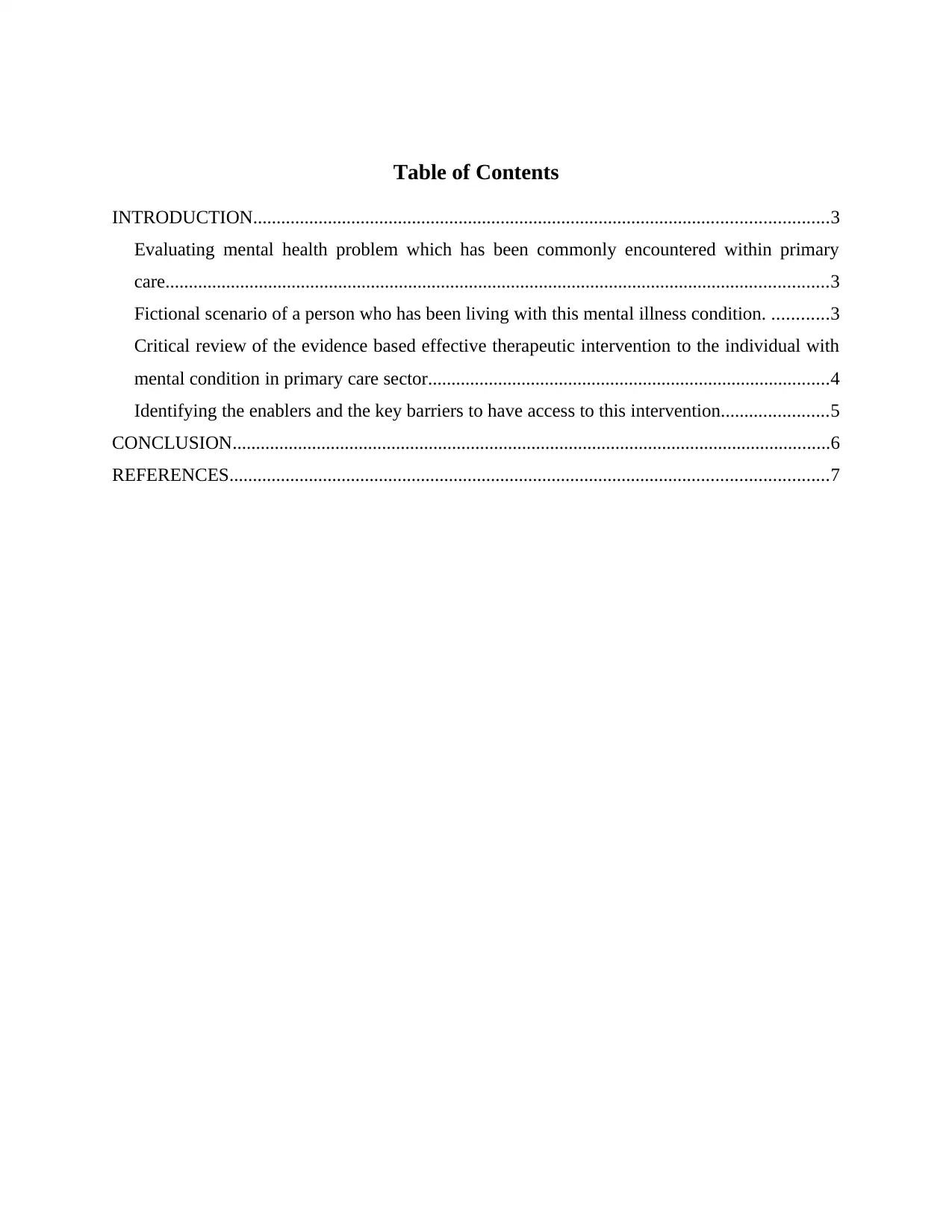
Table of Contents
INTRODUCTION...........................................................................................................................3
Evaluating mental health problem which has been commonly encountered within primary
care..............................................................................................................................................3
Fictional scenario of a person who has been living with this mental illness condition. ............3
Critical review of the evidence based effective therapeutic intervention to the individual with
mental condition in primary care sector......................................................................................4
Identifying the enablers and the key barriers to have access to this intervention.......................5
CONCLUSION................................................................................................................................6
REFERENCES................................................................................................................................7
INTRODUCTION...........................................................................................................................3
Evaluating mental health problem which has been commonly encountered within primary
care..............................................................................................................................................3
Fictional scenario of a person who has been living with this mental illness condition. ............3
Critical review of the evidence based effective therapeutic intervention to the individual with
mental condition in primary care sector......................................................................................4
Identifying the enablers and the key barriers to have access to this intervention.......................5
CONCLUSION................................................................................................................................6
REFERENCES................................................................................................................................7
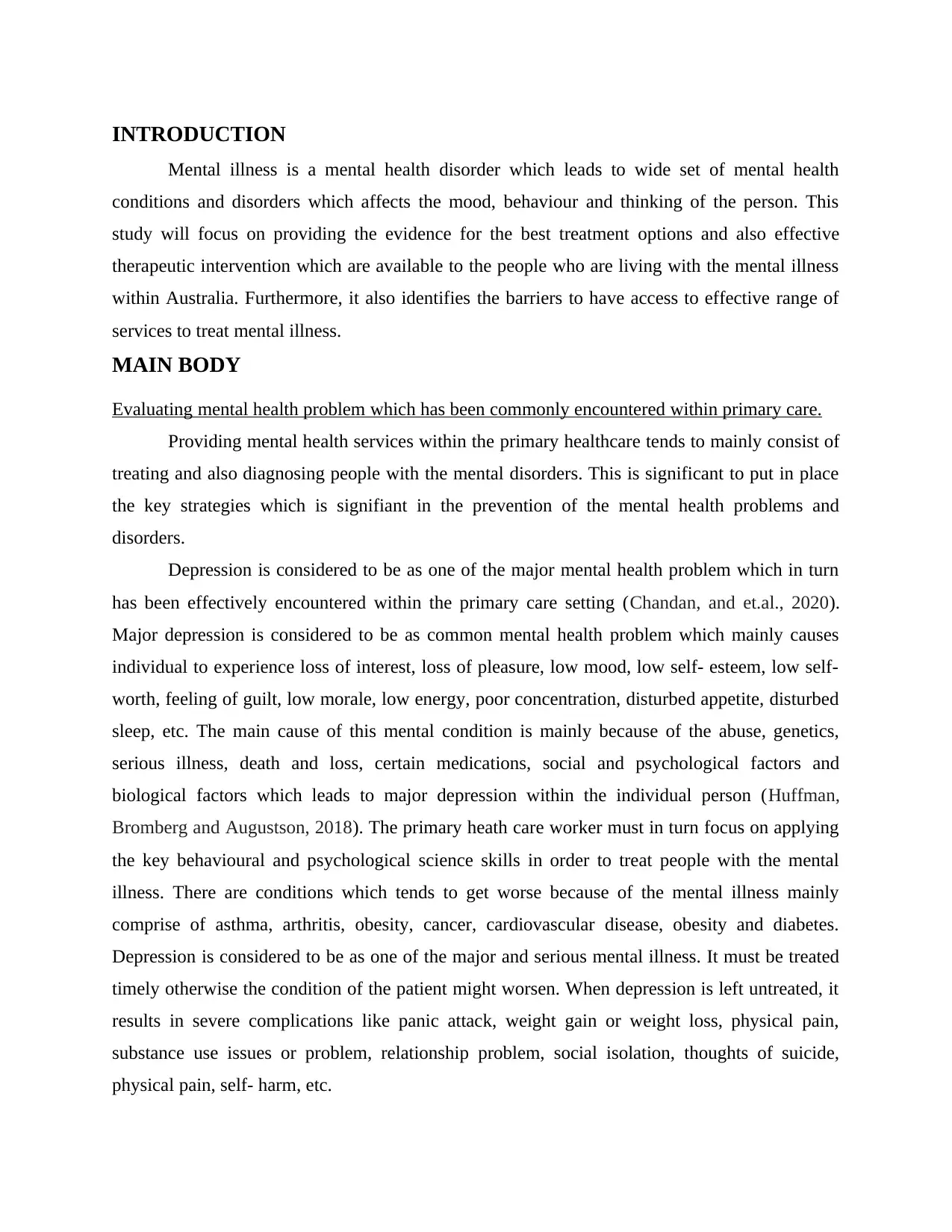
INTRODUCTION
Mental illness is a mental health disorder which leads to wide set of mental health
conditions and disorders which affects the mood, behaviour and thinking of the person. This
study will focus on providing the evidence for the best treatment options and also effective
therapeutic intervention which are available to the people who are living with the mental illness
within Australia. Furthermore, it also identifies the barriers to have access to effective range of
services to treat mental illness.
MAIN BODY
Evaluating mental health problem which has been commonly encountered within primary care.
Providing mental health services within the primary healthcare tends to mainly consist of
treating and also diagnosing people with the mental disorders. This is significant to put in place
the key strategies which is signifiant in the prevention of the mental health problems and
disorders.
Depression is considered to be as one of the major mental health problem which in turn
has been effectively encountered within the primary care setting (Chandan, and et.al., 2020).
Major depression is considered to be as common mental health problem which mainly causes
individual to experience loss of interest, loss of pleasure, low mood, low self- esteem, low self-
worth, feeling of guilt, low morale, low energy, poor concentration, disturbed appetite, disturbed
sleep, etc. The main cause of this mental condition is mainly because of the abuse, genetics,
serious illness, death and loss, certain medications, social and psychological factors and
biological factors which leads to major depression within the individual person (Huffman,
Bromberg and Augustson, 2018). The primary heath care worker must in turn focus on applying
the key behavioural and psychological science skills in order to treat people with the mental
illness. There are conditions which tends to get worse because of the mental illness mainly
comprise of asthma, arthritis, obesity, cancer, cardiovascular disease, obesity and diabetes.
Depression is considered to be as one of the major and serious mental illness. It must be treated
timely otherwise the condition of the patient might worsen. When depression is left untreated, it
results in severe complications like panic attack, weight gain or weight loss, physical pain,
substance use issues or problem, relationship problem, social isolation, thoughts of suicide,
physical pain, self- harm, etc.
Mental illness is a mental health disorder which leads to wide set of mental health
conditions and disorders which affects the mood, behaviour and thinking of the person. This
study will focus on providing the evidence for the best treatment options and also effective
therapeutic intervention which are available to the people who are living with the mental illness
within Australia. Furthermore, it also identifies the barriers to have access to effective range of
services to treat mental illness.
MAIN BODY
Evaluating mental health problem which has been commonly encountered within primary care.
Providing mental health services within the primary healthcare tends to mainly consist of
treating and also diagnosing people with the mental disorders. This is significant to put in place
the key strategies which is signifiant in the prevention of the mental health problems and
disorders.
Depression is considered to be as one of the major mental health problem which in turn
has been effectively encountered within the primary care setting (Chandan, and et.al., 2020).
Major depression is considered to be as common mental health problem which mainly causes
individual to experience loss of interest, loss of pleasure, low mood, low self- esteem, low self-
worth, feeling of guilt, low morale, low energy, poor concentration, disturbed appetite, disturbed
sleep, etc. The main cause of this mental condition is mainly because of the abuse, genetics,
serious illness, death and loss, certain medications, social and psychological factors and
biological factors which leads to major depression within the individual person (Huffman,
Bromberg and Augustson, 2018). The primary heath care worker must in turn focus on applying
the key behavioural and psychological science skills in order to treat people with the mental
illness. There are conditions which tends to get worse because of the mental illness mainly
comprise of asthma, arthritis, obesity, cancer, cardiovascular disease, obesity and diabetes.
Depression is considered to be as one of the major and serious mental illness. It must be treated
timely otherwise the condition of the patient might worsen. When depression is left untreated, it
results in severe complications like panic attack, weight gain or weight loss, physical pain,
substance use issues or problem, relationship problem, social isolation, thoughts of suicide,
physical pain, self- harm, etc.
⊘ This is a preview!⊘
Do you want full access?
Subscribe today to unlock all pages.

Trusted by 1+ million students worldwide
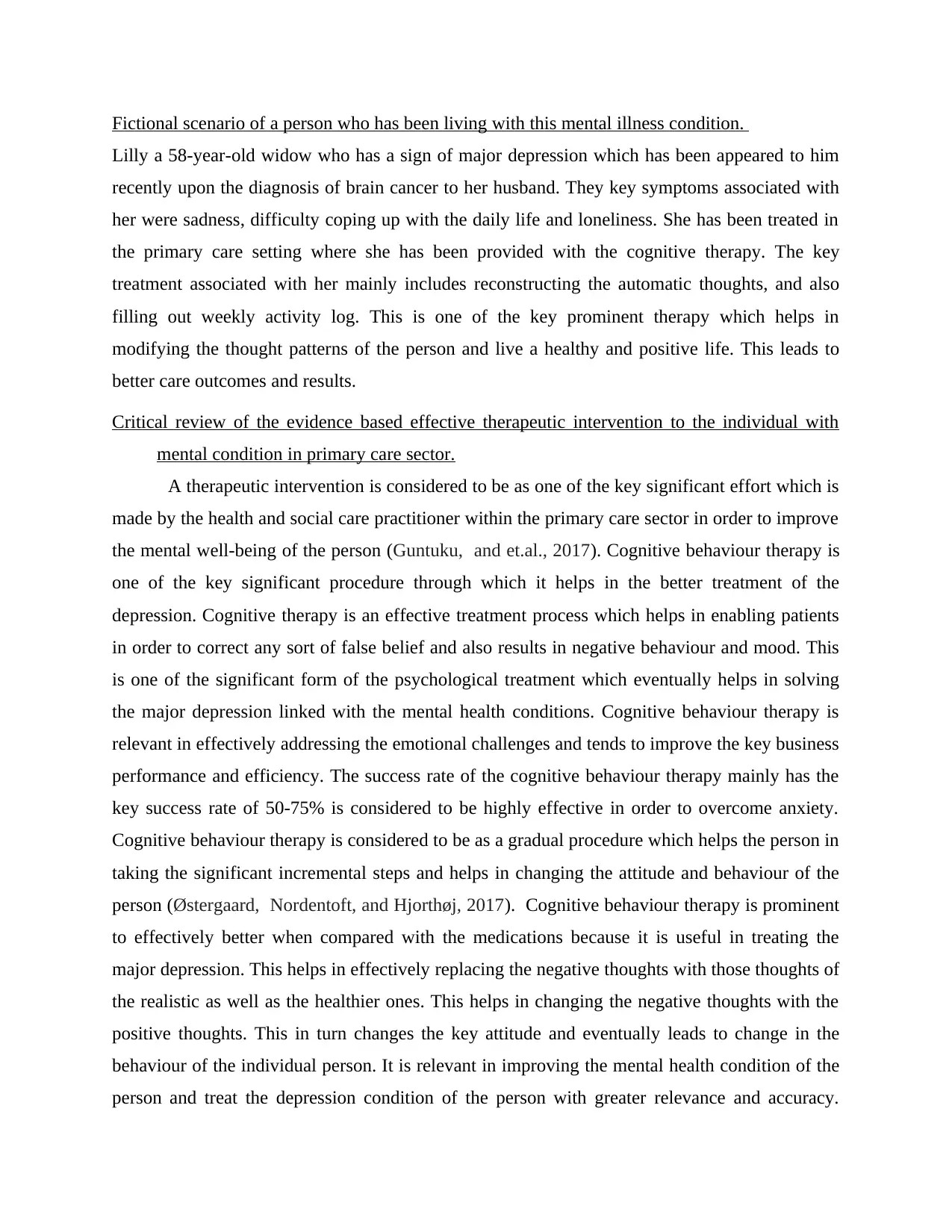
Fictional scenario of a person who has been living with this mental illness condition.
Lilly a 58-year-old widow who has a sign of major depression which has been appeared to him
recently upon the diagnosis of brain cancer to her husband. They key symptoms associated with
her were sadness, difficulty coping up with the daily life and loneliness. She has been treated in
the primary care setting where she has been provided with the cognitive therapy. The key
treatment associated with her mainly includes reconstructing the automatic thoughts, and also
filling out weekly activity log. This is one of the key prominent therapy which helps in
modifying the thought patterns of the person and live a healthy and positive life. This leads to
better care outcomes and results.
Critical review of the evidence based effective therapeutic intervention to the individual with
mental condition in primary care sector.
A therapeutic intervention is considered to be as one of the key significant effort which is
made by the health and social care practitioner within the primary care sector in order to improve
the mental well-being of the person (Guntuku, and et.al., 2017). Cognitive behaviour therapy is
one of the key significant procedure through which it helps in the better treatment of the
depression. Cognitive therapy is an effective treatment process which helps in enabling patients
in order to correct any sort of false belief and also results in negative behaviour and mood. This
is one of the significant form of the psychological treatment which eventually helps in solving
the major depression linked with the mental health conditions. Cognitive behaviour therapy is
relevant in effectively addressing the emotional challenges and tends to improve the key business
performance and efficiency. The success rate of the cognitive behaviour therapy mainly has the
key success rate of 50-75% is considered to be highly effective in order to overcome anxiety.
Cognitive behaviour therapy is considered to be as a gradual procedure which helps the person in
taking the significant incremental steps and helps in changing the attitude and behaviour of the
person (Østergaard, Nordentoft, and Hjorthøj, 2017). Cognitive behaviour therapy is prominent
to effectively better when compared with the medications because it is useful in treating the
major depression. This helps in effectively replacing the negative thoughts with those thoughts of
the realistic as well as the healthier ones. This helps in changing the negative thoughts with the
positive thoughts. This in turn changes the key attitude and eventually leads to change in the
behaviour of the individual person. It is relevant in improving the mental health condition of the
person and treat the depression condition of the person with greater relevance and accuracy.
Lilly a 58-year-old widow who has a sign of major depression which has been appeared to him
recently upon the diagnosis of brain cancer to her husband. They key symptoms associated with
her were sadness, difficulty coping up with the daily life and loneliness. She has been treated in
the primary care setting where she has been provided with the cognitive therapy. The key
treatment associated with her mainly includes reconstructing the automatic thoughts, and also
filling out weekly activity log. This is one of the key prominent therapy which helps in
modifying the thought patterns of the person and live a healthy and positive life. This leads to
better care outcomes and results.
Critical review of the evidence based effective therapeutic intervention to the individual with
mental condition in primary care sector.
A therapeutic intervention is considered to be as one of the key significant effort which is
made by the health and social care practitioner within the primary care sector in order to improve
the mental well-being of the person (Guntuku, and et.al., 2017). Cognitive behaviour therapy is
one of the key significant procedure through which it helps in the better treatment of the
depression. Cognitive therapy is an effective treatment process which helps in enabling patients
in order to correct any sort of false belief and also results in negative behaviour and mood. This
is one of the significant form of the psychological treatment which eventually helps in solving
the major depression linked with the mental health conditions. Cognitive behaviour therapy is
relevant in effectively addressing the emotional challenges and tends to improve the key business
performance and efficiency. The success rate of the cognitive behaviour therapy mainly has the
key success rate of 50-75% is considered to be highly effective in order to overcome anxiety.
Cognitive behaviour therapy is considered to be as a gradual procedure which helps the person in
taking the significant incremental steps and helps in changing the attitude and behaviour of the
person (Østergaard, Nordentoft, and Hjorthøj, 2017). Cognitive behaviour therapy is prominent
to effectively better when compared with the medications because it is useful in treating the
major depression. This helps in effectively replacing the negative thoughts with those thoughts of
the realistic as well as the healthier ones. This helps in changing the negative thoughts with the
positive thoughts. This in turn changes the key attitude and eventually leads to change in the
behaviour of the individual person. It is relevant in improving the mental health condition of the
person and treat the depression condition of the person with greater relevance and accuracy.
Paraphrase This Document
Need a fresh take? Get an instant paraphrase of this document with our AI Paraphraser
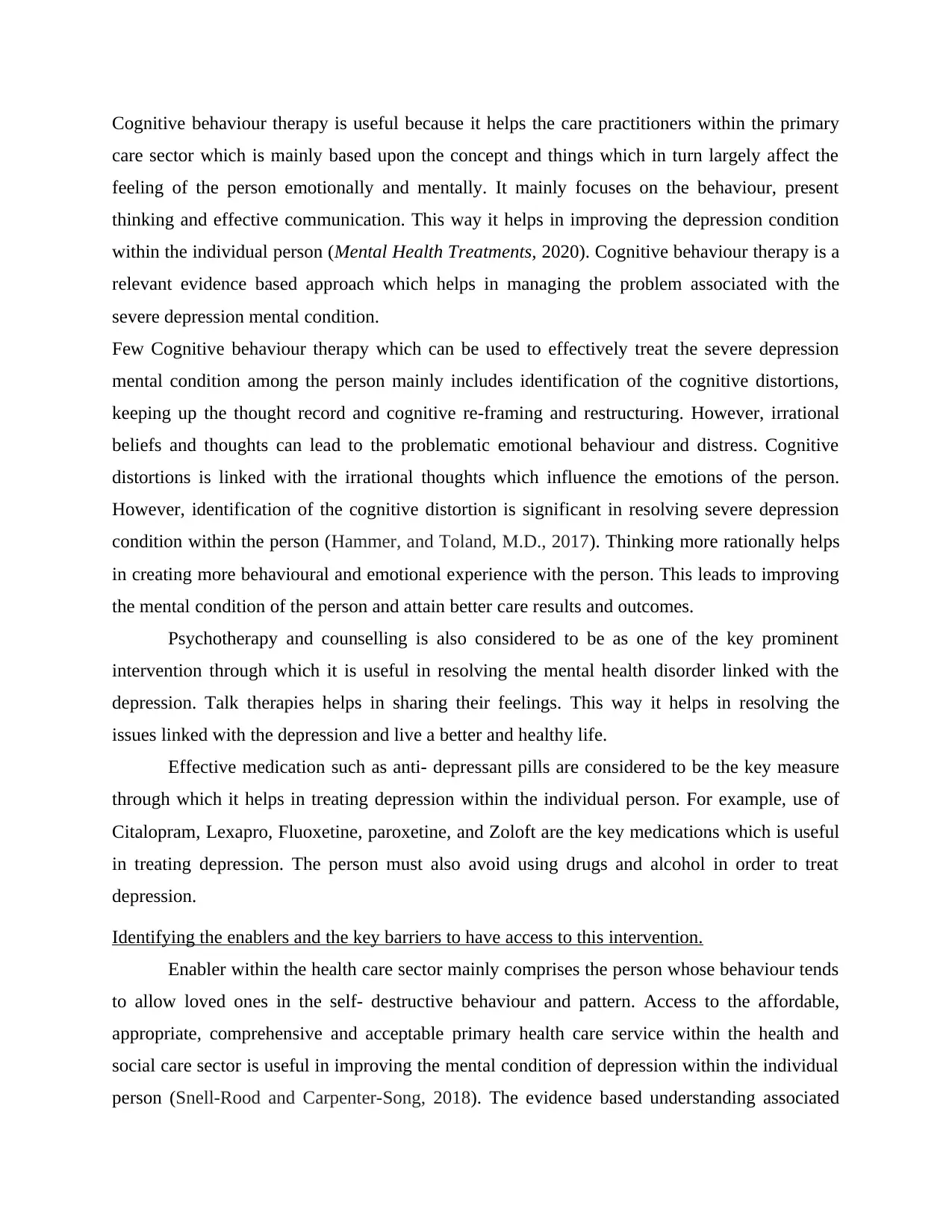
Cognitive behaviour therapy is useful because it helps the care practitioners within the primary
care sector which is mainly based upon the concept and things which in turn largely affect the
feeling of the person emotionally and mentally. It mainly focuses on the behaviour, present
thinking and effective communication. This way it helps in improving the depression condition
within the individual person (Mental Health Treatments, 2020). Cognitive behaviour therapy is a
relevant evidence based approach which helps in managing the problem associated with the
severe depression mental condition.
Few Cognitive behaviour therapy which can be used to effectively treat the severe depression
mental condition among the person mainly includes identification of the cognitive distortions,
keeping up the thought record and cognitive re-framing and restructuring. However, irrational
beliefs and thoughts can lead to the problematic emotional behaviour and distress. Cognitive
distortions is linked with the irrational thoughts which influence the emotions of the person.
However, identification of the cognitive distortion is significant in resolving severe depression
condition within the person (Hammer, and Toland, M.D., 2017). Thinking more rationally helps
in creating more behavioural and emotional experience with the person. This leads to improving
the mental condition of the person and attain better care results and outcomes.
Psychotherapy and counselling is also considered to be as one of the key prominent
intervention through which it is useful in resolving the mental health disorder linked with the
depression. Talk therapies helps in sharing their feelings. This way it helps in resolving the
issues linked with the depression and live a better and healthy life.
Effective medication such as anti- depressant pills are considered to be the key measure
through which it helps in treating depression within the individual person. For example, use of
Citalopram, Lexapro, Fluoxetine, paroxetine, and Zoloft are the key medications which is useful
in treating depression. The person must also avoid using drugs and alcohol in order to treat
depression.
Identifying the enablers and the key barriers to have access to this intervention.
Enabler within the health care sector mainly comprises the person whose behaviour tends
to allow loved ones in the self- destructive behaviour and pattern. Access to the affordable,
appropriate, comprehensive and acceptable primary health care service within the health and
social care sector is useful in improving the mental condition of depression within the individual
person (Snell-Rood and Carpenter-Song, 2018). The evidence based understanding associated
care sector which is mainly based upon the concept and things which in turn largely affect the
feeling of the person emotionally and mentally. It mainly focuses on the behaviour, present
thinking and effective communication. This way it helps in improving the depression condition
within the individual person (Mental Health Treatments, 2020). Cognitive behaviour therapy is a
relevant evidence based approach which helps in managing the problem associated with the
severe depression mental condition.
Few Cognitive behaviour therapy which can be used to effectively treat the severe depression
mental condition among the person mainly includes identification of the cognitive distortions,
keeping up the thought record and cognitive re-framing and restructuring. However, irrational
beliefs and thoughts can lead to the problematic emotional behaviour and distress. Cognitive
distortions is linked with the irrational thoughts which influence the emotions of the person.
However, identification of the cognitive distortion is significant in resolving severe depression
condition within the person (Hammer, and Toland, M.D., 2017). Thinking more rationally helps
in creating more behavioural and emotional experience with the person. This leads to improving
the mental condition of the person and attain better care results and outcomes.
Psychotherapy and counselling is also considered to be as one of the key prominent
intervention through which it is useful in resolving the mental health disorder linked with the
depression. Talk therapies helps in sharing their feelings. This way it helps in resolving the
issues linked with the depression and live a better and healthy life.
Effective medication such as anti- depressant pills are considered to be the key measure
through which it helps in treating depression within the individual person. For example, use of
Citalopram, Lexapro, Fluoxetine, paroxetine, and Zoloft are the key medications which is useful
in treating depression. The person must also avoid using drugs and alcohol in order to treat
depression.
Identifying the enablers and the key barriers to have access to this intervention.
Enabler within the health care sector mainly comprises the person whose behaviour tends
to allow loved ones in the self- destructive behaviour and pattern. Access to the affordable,
appropriate, comprehensive and acceptable primary health care service within the health and
social care sector is useful in improving the mental condition of depression within the individual
person (Snell-Rood and Carpenter-Song, 2018). The evidence based understanding associated
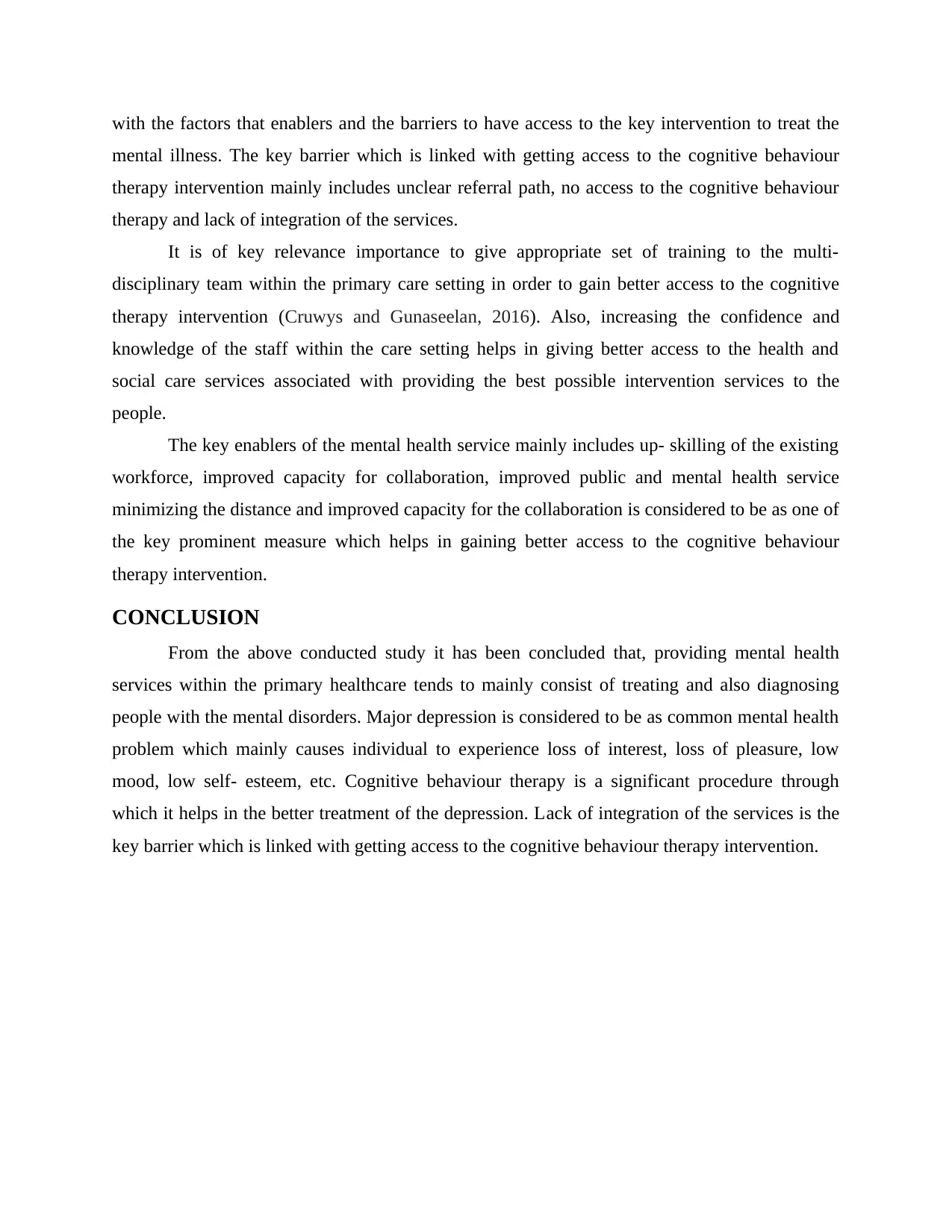
with the factors that enablers and the barriers to have access to the key intervention to treat the
mental illness. The key barrier which is linked with getting access to the cognitive behaviour
therapy intervention mainly includes unclear referral path, no access to the cognitive behaviour
therapy and lack of integration of the services.
It is of key relevance importance to give appropriate set of training to the multi-
disciplinary team within the primary care setting in order to gain better access to the cognitive
therapy intervention (Cruwys and Gunaseelan, 2016). Also, increasing the confidence and
knowledge of the staff within the care setting helps in giving better access to the health and
social care services associated with providing the best possible intervention services to the
people.
The key enablers of the mental health service mainly includes up- skilling of the existing
workforce, improved capacity for collaboration, improved public and mental health service
minimizing the distance and improved capacity for the collaboration is considered to be as one of
the key prominent measure which helps in gaining better access to the cognitive behaviour
therapy intervention.
CONCLUSION
From the above conducted study it has been concluded that, providing mental health
services within the primary healthcare tends to mainly consist of treating and also diagnosing
people with the mental disorders. Major depression is considered to be as common mental health
problem which mainly causes individual to experience loss of interest, loss of pleasure, low
mood, low self- esteem, etc. Cognitive behaviour therapy is a significant procedure through
which it helps in the better treatment of the depression. Lack of integration of the services is the
key barrier which is linked with getting access to the cognitive behaviour therapy intervention.
mental illness. The key barrier which is linked with getting access to the cognitive behaviour
therapy intervention mainly includes unclear referral path, no access to the cognitive behaviour
therapy and lack of integration of the services.
It is of key relevance importance to give appropriate set of training to the multi-
disciplinary team within the primary care setting in order to gain better access to the cognitive
therapy intervention (Cruwys and Gunaseelan, 2016). Also, increasing the confidence and
knowledge of the staff within the care setting helps in giving better access to the health and
social care services associated with providing the best possible intervention services to the
people.
The key enablers of the mental health service mainly includes up- skilling of the existing
workforce, improved capacity for collaboration, improved public and mental health service
minimizing the distance and improved capacity for the collaboration is considered to be as one of
the key prominent measure which helps in gaining better access to the cognitive behaviour
therapy intervention.
CONCLUSION
From the above conducted study it has been concluded that, providing mental health
services within the primary healthcare tends to mainly consist of treating and also diagnosing
people with the mental disorders. Major depression is considered to be as common mental health
problem which mainly causes individual to experience loss of interest, loss of pleasure, low
mood, low self- esteem, etc. Cognitive behaviour therapy is a significant procedure through
which it helps in the better treatment of the depression. Lack of integration of the services is the
key barrier which is linked with getting access to the cognitive behaviour therapy intervention.
⊘ This is a preview!⊘
Do you want full access?
Subscribe today to unlock all pages.

Trusted by 1+ million students worldwide
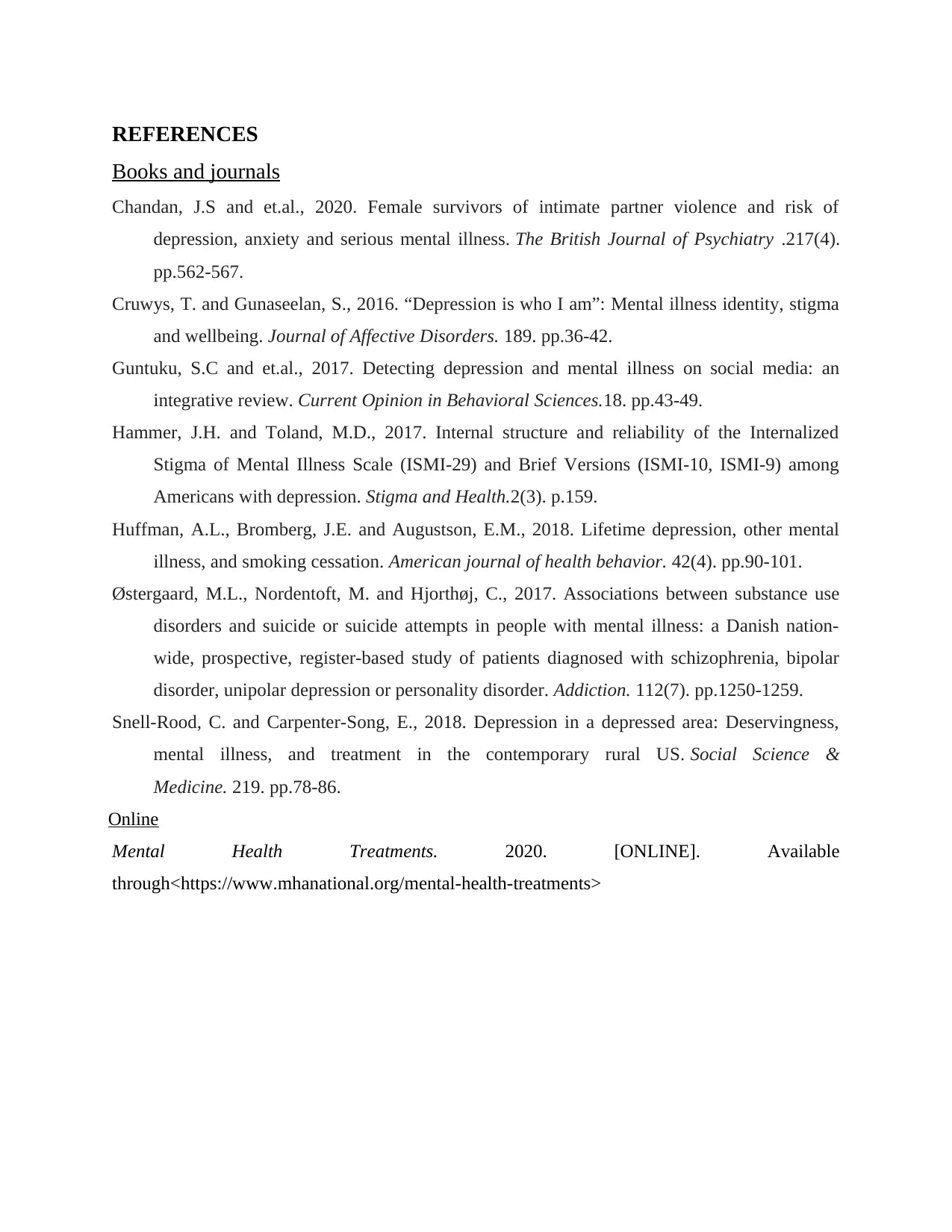
REFERENCES
Books and journals
Chandan, J.S and et.al., 2020. Female survivors of intimate partner violence and risk of
depression, anxiety and serious mental illness. The British Journal of Psychiatry .217(4).
pp.562-567.
Cruwys, T. and Gunaseelan, S., 2016. “Depression is who I am”: Mental illness identity, stigma
and wellbeing. Journal of Affective Disorders. 189. pp.36-42.
Guntuku, S.C and et.al., 2017. Detecting depression and mental illness on social media: an
integrative review. Current Opinion in Behavioral Sciences.18. pp.43-49.
Hammer, J.H. and Toland, M.D., 2017. Internal structure and reliability of the Internalized
Stigma of Mental Illness Scale (ISMI-29) and Brief Versions (ISMI-10, ISMI-9) among
Americans with depression. Stigma and Health.2(3). p.159.
Huffman, A.L., Bromberg, J.E. and Augustson, E.M., 2018. Lifetime depression, other mental
illness, and smoking cessation. American journal of health behavior. 42(4). pp.90-101.
Østergaard, M.L., Nordentoft, M. and Hjorthøj, C., 2017. Associations between substance use
disorders and suicide or suicide attempts in people with mental illness: a Danish nation‐
wide, prospective, register‐based study of patients diagnosed with schizophrenia, bipolar
disorder, unipolar depression or personality disorder. Addiction. 112(7). pp.1250-1259.
Snell-Rood, C. and Carpenter-Song, E., 2018. Depression in a depressed area: Deservingness,
mental illness, and treatment in the contemporary rural US. Social Science &
Medicine. 219. pp.78-86.
Online
Mental Health Treatments. 2020. [ONLINE]. Available
through<https://www.mhanational.org/mental-health-treatments>
Books and journals
Chandan, J.S and et.al., 2020. Female survivors of intimate partner violence and risk of
depression, anxiety and serious mental illness. The British Journal of Psychiatry .217(4).
pp.562-567.
Cruwys, T. and Gunaseelan, S., 2016. “Depression is who I am”: Mental illness identity, stigma
and wellbeing. Journal of Affective Disorders. 189. pp.36-42.
Guntuku, S.C and et.al., 2017. Detecting depression and mental illness on social media: an
integrative review. Current Opinion in Behavioral Sciences.18. pp.43-49.
Hammer, J.H. and Toland, M.D., 2017. Internal structure and reliability of the Internalized
Stigma of Mental Illness Scale (ISMI-29) and Brief Versions (ISMI-10, ISMI-9) among
Americans with depression. Stigma and Health.2(3). p.159.
Huffman, A.L., Bromberg, J.E. and Augustson, E.M., 2018. Lifetime depression, other mental
illness, and smoking cessation. American journal of health behavior. 42(4). pp.90-101.
Østergaard, M.L., Nordentoft, M. and Hjorthøj, C., 2017. Associations between substance use
disorders and suicide or suicide attempts in people with mental illness: a Danish nation‐
wide, prospective, register‐based study of patients diagnosed with schizophrenia, bipolar
disorder, unipolar depression or personality disorder. Addiction. 112(7). pp.1250-1259.
Snell-Rood, C. and Carpenter-Song, E., 2018. Depression in a depressed area: Deservingness,
mental illness, and treatment in the contemporary rural US. Social Science &
Medicine. 219. pp.78-86.
Online
Mental Health Treatments. 2020. [ONLINE]. Available
through<https://www.mhanational.org/mental-health-treatments>
1 out of 7
Related Documents
Your All-in-One AI-Powered Toolkit for Academic Success.
+13062052269
info@desklib.com
Available 24*7 on WhatsApp / Email
![[object Object]](/_next/static/media/star-bottom.7253800d.svg)
Unlock your academic potential
Copyright © 2020–2026 A2Z Services. All Rights Reserved. Developed and managed by ZUCOL.





